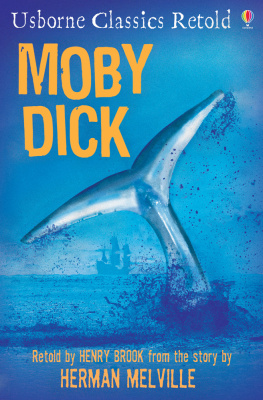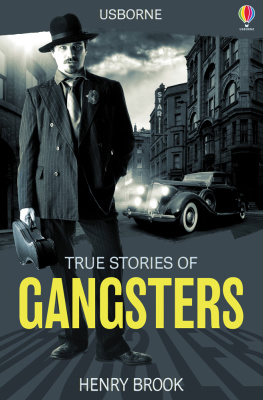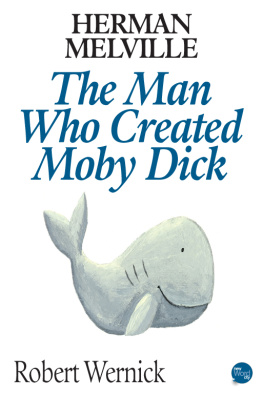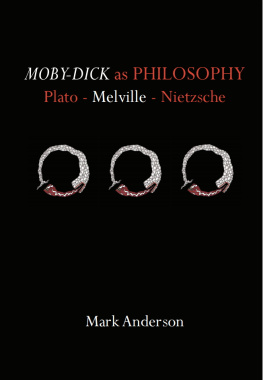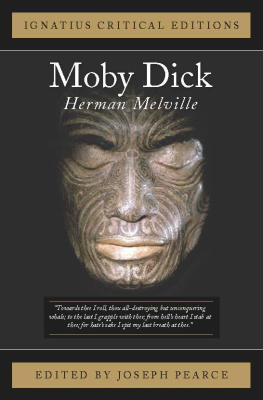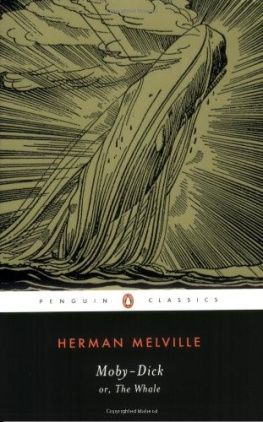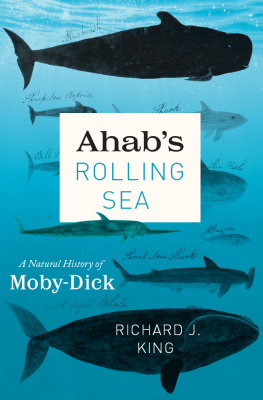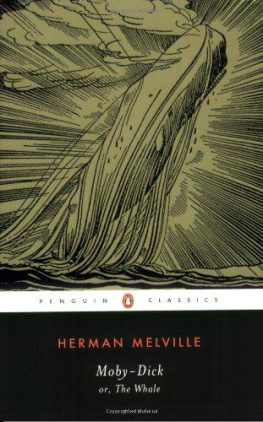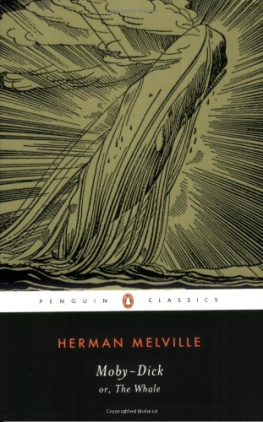Henry Brook - Moby Dick
Here you can read online Henry Brook - Moby Dick full text of the book (entire story) in english for free. Download pdf and epub, get meaning, cover and reviews about this ebook. year: 2014, publisher: Usborne Publishing Ltd, genre: Adventure. Description of the work, (preface) as well as reviews are available. Best literature library LitArk.com created for fans of good reading and offers a wide selection of genres:
Romance novel
Science fiction
Adventure
Detective
Science
History
Home and family
Prose
Art
Politics
Computer
Non-fiction
Religion
Business
Children
Humor
Choose a favorite category and find really read worthwhile books. Enjoy immersion in the world of imagination, feel the emotions of the characters or learn something new for yourself, make an fascinating discovery.
- Book:Moby Dick
- Author:
- Publisher:Usborne Publishing Ltd
- Genre:
- Year:2014
- Rating:5 / 5
- Favourites:Add to favourites
- Your mark:
- 100
- 1
- 2
- 3
- 4
- 5
Moby Dick: summary, description and annotation
We offer to read an annotation, description, summary or preface (depends on what the author of the book "Moby Dick" wrote himself). If you haven't found the necessary information about the book — write in the comments, we will try to find it.
Moby Dick — read online for free the complete book (whole text) full work
Below is the text of the book, divided by pages. System saving the place of the last page read, allows you to conveniently read the book "Moby Dick" online for free, without having to search again every time where you left off. Put a bookmark, and you can go to the page where you finished reading at any time.
Font size:
Interval:
Bookmark:
When literary experts argue over which is the greatest novel ever written in English, Moby Dick is always a strong contender. It is the story of Captain Ahabs obsessive hunt for the malevolent, snow-white whale, which dismasted him on an earlier voyage by tearing off his leg. Ahabs quest for vengeance lies at the heart of the book, but the author, Herman Melville, wanted to do more than write a simple narrative. His book includes such a number of discussions, explorations, diversions and descriptions that they dazzle the reader. Moby Dick is a book of books, as mighty and complex as the creature whose name it bears.
Melville had already written five novels when he sat down to begin his masterpiece in 1850. He had a solid reputation for creating thrilling sea adventures, but it was the nature and condition of mankind that really fascinated him. His library was full of books on philosophy, religion, science and history, and he was looking for a way to present some of his ideas on these topics to his readers. So, he cast around for a subject that was broad enough to do this. The idea of an attacking whale nature turning on mankind set against the backdrop of humans hunting one of the Earths most majestic creatures to the point of extinction, seemed a perfect choice.
He had heard some tales about a sperm whale, sighted in the waters off Chile in the early 1800s, that was renowned for two things it was unusually aggressive, and its skin was as white as pure new wool. Sailors sometimes gave nicknames to notable whales and this animal was known as Mocha Dick, after Mocha, the island where he was first sighted, and Dick, the name of the whaler who had pursued him. Mocha Dick killed several boat crews over the years, until he was fatally harpooned, and his hardiness shocked the whaling community. When his body was examined, no fewer than 20 rusting harpoon heads were found embedded in his blubber. Melville combined this story with another real event the sinking of the whale ship Essex in 1820.
The Essex had suffered a fate that made every whaling crew shudder. A rogue sperm whale had rammed her below the waterline repeatedly, as if determined to do her harm. The first mate even recorded the whales malevolence in his account: I could distinctly see him smite his jaws together, as if distracted with rage and fury. When the ship sank, the horrified crew drifted for months in small boats. Many of them died of starvation and thirst.
Using elements of this disaster and the story of Mocha Dick, Melville shaped his main character the white whale, Moby Dick. This destructive, mysterious beast haunts the novel, generating a sense of foreboding that ripples across the pages. Writing and rewriting at a furious pace, Melville created a character worthy of hunting such a beast Captain Ahab. The captain is an extraordinary individual, teetering between greatness of mind and crazed violent action, after 40 years of scouring the worlds oceans for whales. Only the gentle, tender-hearted Ishmael, the books narrator, has any hope of escaping Ahabs obsessive and hateful influence.
The ship itself, the Pequod , carries sailors from all parts of the world. As a symbol of human folly, greed and viciousness, the ship has no equal in English literature. Even its name is significant. The Pequod were a celebrated tribe of Native American Indians who had been persecuted and hunted out of existence by white settlers.
This reference to the destruction of a people suggests what Melville intended to do with his novel. Some commentators see the Pequod as a ship of state, symbolizing a nation with a deranged dictator at the helm. Others see the whaling industry as a wider symbol for the way western societies were dismantling and destroying nature. But, however you approach it, Moby Dick is above all a gripping sea adventure, with a range of characters and thrilling scenes that few other books can match.
Longing to go to sea, Ishmael signs up for a voyage on the whaling ship Pequod . The ships captain, Ahab, soon reveals his true mission. He wants revenge on the whale that maimed him. The chase takes Ishmael to the other side of the world and ends in a terrifying fight for survival.
Powerfully retold for todays readers, Herman Melvilles tragic adventure story remains as thrilling and atmospheric as when it was first published over 100 years ago.
Moby Dick might have been his greatest book, but it was also the work that effectively finished Herman Melvilles literary career. Contemporary critics hated it. Not worth the money asked for it, either as a literary work or as a mass of printed paper, was the crushing verdict of one newspaper reviewer. To others, it was too long, garbled, meandering and gloomy. Melville shrugged off the criticism, but the comments must have stung the young author. He had put his heart and soul into the novel, and would live to see it taken out of print and be largely forgotten by the international literary elite.
Melville was born in August 1819, in New York City. The family business collapsed when Herman was eleven, and his father died two years later. Herman was forced to work to support the family, and so he went to sea as a cabin boy. Even as a young man, he had a writers eye and a mind open to the complexities of the world around him. While his shipmates were off carousing in public bars around the English port of Liverpool, Melville went wandering through the slums, trying to make sense of the inequalities and hardships of the industrial age. At 21, he was employed on the whaler Acushnet and sailed off around the world. The captain was barbaric towards his men, starving and punishing them like a tyrant. So Melville jumped ship in the Marquesas islands in the Pacific, and lived with a tribe of Typee natives for four weeks. When he finally worked his way back to his family home in Massachusetts, he was bursting with stories and tall tales about his adventures. A friend suggested he jot them down for publication.
The result was his first book, Typee (published in 1846), describing his experiences among the cannibals. His descriptions of tropical scenes and exotic islanders were a hit with the genteel readers of New England. Melville wasted no time in completing a second South Sea diary, Omoo (1847). Reviewers praised the books for their entertainment value as roguish adventures. But if you read them carefully, you will find Melville making real insights into cultural differences, and the corrupting influence of western visitors on local traditions.
With a taste of literary success, Melville married and settled down to the craft of writing. Between 1849 and 1850, he published three novels: Mardi, Redburn and Whitejacket . These all deal with men or women trying to understand the intricacies of the world, and the dehumanizing effects of money and so-called progress. In 1850, he was at the peak of his powers, and thirstier than ever for knowledge. Melville was reading so much, doctors warned him he might lose his eyesight if he didnt take it easy.
Around this time he met the author Nathaniel Hawthorne (to whom he dedicated Moby Dick ), and the two men spent hours together, discussing philosophy and politics. The United States was approaching crisis as pressure grew around the issue of slavery. In a decade, the country would break into rival factions and fight a terrible civil war. Melville observed these increasing tensions with anguish. His fears, filtered through the incredibly wide reading he had been doing, resulted in his finest book, Moby Dick (1851). Despite the immense strain of completing it, he rushed straight into writing another, Pierre (1852). It was to be his last major published work.
In the following years, Melville suffered from depression his wifes family even tried to convince her he was insane. He also struggled financially. He published short stories and gave lecture tours, but these never attracted the large numbers of people that had been drawn to his early books. In 1866, Melville was forced to take a job as a customs inspector on the New York docks. He resigned in 1885 and lived quietly until his death in 1891. The only works he published in these later years were small collections of poems which were distributed among close friends.
Font size:
Interval:
Bookmark:
Similar books «Moby Dick»
Look at similar books to Moby Dick. We have selected literature similar in name and meaning in the hope of providing readers with more options to find new, interesting, not yet read works.
Discussion, reviews of the book Moby Dick and just readers' own opinions. Leave your comments, write what you think about the work, its meaning or the main characters. Specify what exactly you liked and what you didn't like, and why you think so.

